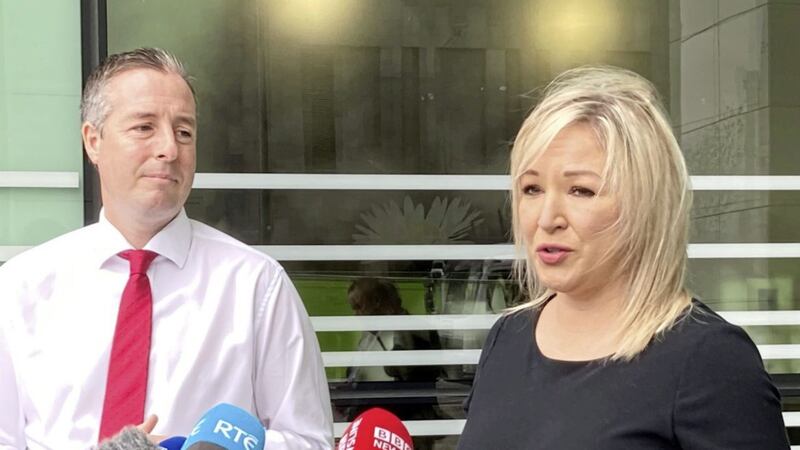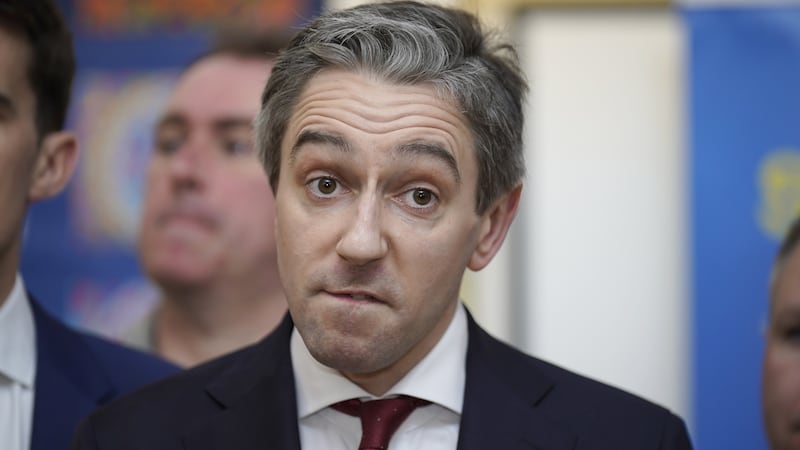It can be difficult to follow changing Covid restrictions, let alone the politics behind them, so the simplicity of Stormont’s latest decision is refreshing. All the restrictions the executive has been dithering over for months suddenly have to be lifted because furlough has run out. That’s it, frankly. The first and deputy first ministers as good as admitted it, issuing a joint statement that began: “With furlough due to end in a few days…”
There would once have been a complication with the DUP’s ideological inclination against restrictions and for UK alignment, and Sinn Féin’s inclination towards restrictions and for all-Ireland alignment. However, Sinn Féin has judged its supporters to be as fed up as DUP supporters, so there is no evident difference of opinion within the Executive Office. It is a hands across the barricades moment. Washing hands of responsibility will come later.
**
Sinn Féin’s new position explains why it joined the DUP and UUP in opposing vaccine passports, which were demanded last week by SDLP leader Colum Eastwood.
Confusion did arise when UUP health minister Robin Swann said he had proposed developing a £10 million passport system in April but the rest of the executive had “shown no interest”.
Asked why he had voted against passports this week, Swann said it is because there are none due to that disinterest, so restrictions now have to be lifted without them.
While there may be an element of chicken and egg in this argument, the SDLP reacted with disproportionate indignation. It is a sad fact of life that people will occasionally imply a political party, even one led by Colum Eastwood, might have engaged in some light-on-detail grandstanding.
**
Observers may be too quick to see the influence of Peter Robinson in DUP actions since Jeffrey Donaldson brought him back into party headquarters as an adviser.
Nevertheless, a statement from four unionist parties opposing the protocol looks suspiciously like a hokey graduated forum device.
Although all unionist parties clearly do oppose the protocol, there is some surprise that UUP leader Doug Beattie got drawn into this Robinsonesque scheme a mere three days after telling Donaldson to get lost over a unionist electoral pact - very much another Robinsonesque scheme.
Yet Beattie’s move is hardly unprecedented. Mike Nesbitt, a UUP leader so liberal he wanted a voter pact with the SDLP, found himself sitting on a forum with the DUP and loyalists in 2014, threatening to walk out of Stormont over an the Ardoyne Orange Order parade.
**
Jeffrey Donaldson made his call for a unionist pact in a Belfast Telegraph interview. Reaction to the call overshadowed several interesting points in the piece, in particular a pledge to allow more conscience votes on social issues, decided by party officers “on a case-by-case basis”.
This is canny party management and repositioning. Donaldson cannot whip the DUP into social liberalism but he can judiciously stay the whip to put more liberal members on display.
As mentioned, the influence of Peter Robinson should not be lazily presumed. But letting headquarters decide when MLAs can use their conscience looks like the ultimate Robinsonesque policy.
**
Marks & Spencer is the supermarket chain most threatened by the protocol, as such an unusually high proportion of its product lines are own-brand ready meals and chilled meat. Centralised distribution in relatively low volumes means highly mixed consignments from Britain, making its sea border problem significantly worse. The company has been warning all year it will struggle to cope once the grace period on agrifood ends. It cancelled Christmas ordering just last month, although the grace period was extended, saying there is still “too much risk”.
Yet now it emerges Marks & Spencer has told a property developer it wants seven large new food stores in Northern Ireland, in edge of town locations. Has the company decided it can manage the protocol after all? Does it have reason to believe there are major mitigations on the horizon, or that the grace period will be in place long term?
There is another explanation. In two of the seven locations, Carrickfergus and Armagh, Marks & Spencer already has large edge-of-town food stores. Like the rest of us, perhaps it is just finding all this Brexit and Northern Ireland stuff a bit confusing.
**
The Department for Infrastructure has launched another year of ‘Road Safety Grants’, with ten awards of £10,000 on offer to individuals or community groups to reduce accidents and encourage walking and cycling.
However, the money may not be spent on “capital projects to change roads or pavements, install traffic calming measures such as speed bumps or traffic lights, installation of cycle lanes or to procure assets.”
The only campaign the department cites in its publicity is a Poleglass group that used a grant last year to raise “awareness of the dangers on our roads”. In short, warning people not to walk or cycle is all this scheme is allowed to achieve.
Of course, most neighbourhoods could introduce de facto traffic calming and improve walking and cycling if everyone just parked properly on the street instead of half-on the pavement. But awareness of that is the last thing the car-focused department would want to encourage.









